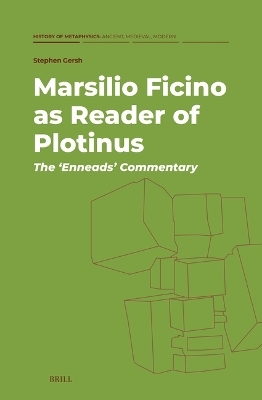
Marsilio Ficino as Reader of Plotinus: The ‘Enneads’ Commentary
Brill (Verlag)
978-90-04-70111-3 (ISBN)
This book represents the first ever systematic philosophical study of Marsilio Ficino’s Commentary on Plotinus’ ‘Enneads’ (first published in Florence, 1492), this work of Ficino being arguably as definitive for the Florentine thinker’s later work as the Platonic Theology was for his earlier. Publication of the present study uniquely illuminates the extent to which Plotinus had always been the crucial influence over Ficino’s revolutionary projects of introducing Platonic thought based on original Greek sources to western Europe, correcting certain features of late medieval and Renaissance Aristotelianism, and laying the foundations of a new Christian Platonism. The study can be read both as an independent introduction to Ficino’s later philosophy and as the complement to the first modern edition and translation of the Commentary on the 'Enneads' itself also by Stephen Gersh (I Tatti Renaissance Library, 2017-).
Stephen Gersh, Litt. D (2019), Cambridge University, former Fellow of Magdalene College, Cambridge and Emeritus Professor of Medieval Philosophy, University of Notre Dame, Indiana, has published many books on ancient, medieval, and modern philosophy including From Iamblichus to Eriugena (Brill, 1978).
Acknowledgements
Citations of the Plotinus Commentary
Preface
General Introduction: The Commentary on Plotinus’ Enneads
1 Religious Philosophy or Philosophical Religion
2 Plotinus’ Disclosure of Plato’s Mysteries
3 The Correction of Peripateticism
4 The Exegetical Approach to the Enneads
5 The Place of the Plotinus Commentary in Ficino’s Work
6 The Place of the Commentary in the Earlier “Plotinian” Tradition
Excursus 0: The Problem of Ficino’s exhortatio
Part 1: Analogy and Trinity
1 Plotinus and Christianity
1.1 The Christian Context
1.2 The Three Primary Substances: Terminology
1.3 The Heretical Errors
2 Ficino’s Logic of Analogy
2.1 The Platonic Genera and Their Mysteries
2.2 The Analogy between Platonic Genera and Peripatetic Categories
2.3 Ficino and Analogy
2.4 Ratio and Analogy
Excursus 2: Substance and Quality
x2.1 Substance
x2.2 Quality
3 The Trinitarian Analogue
3.1 Ficino, Plotinus, and Aquinas on the Trinity
3.2 The “Plotinian” Trinity
Part 2: From Ontology to Agathology
4 The Structure of Soul
4.1 Importance of the Commentary on Ennead I
4.2 Soul and Animate Being
4.3 From Microcosm to Macrocosm
5 The Unembodied Soul
5.1 The Higher Soul in the Commentary on Ennead I
5.2 Summary of Ficino’s Doctrine of Soul
5.3 The Higher Soul in the Commentary on Ennead IV
6 The Embodied Soul
6.1 The Embodied Soul in the Commentary on Ennead IV
7 Transmigration and Embodiment
7.1 Ficino against Transmigration
7.2 Ficino and Origen
8 Sensation
8.1 General Theory of Sensation
8.2 Ficino’s Innovations
8.3 Vision
9 Intellect and Ideas
9.1 Intellect and Intellectual Soul
9.2 Analogies of Light
9.3 The Divine “Splendour” and “Figure”
9.4 Intellect’s Relation to the Ideas
9.5 The Relation of Ideas to One Another
9.6 The Range of Ideas
9.7 The Distinction between Intellect and the Intelligible
9.8 Agent and Possible Intellect
9.9 The Distinction between Discursive and Non-discursive Thinking
9.10 Ideas, Formulae, and Seminal Reason-Principles
9.11 The Temporalization of the Ideas
9.12 Intellect’s Relation to Number
10 Soul’s Choice between Good and Evil
10.1 The Good
10.2 The Multiplicity of Goods
10.3 The (Sub-) Contrariety of Good and Evil
10.4 The Soul’s Choice: Ficino between Plotinus and Augustine
11 The Threefold Reversion
11.1 Return and Triplicity
11.2 The Triadic Preamble to Ennead I. 3
11.3 The Commentary Proper
12 Ascent to Beauty
12.1 Irradiation of Beauty: lumen and color
12.2 The Divine Nature of Beauty: lumen
12.3 Reception of Beauty: splendor
13 Ascent to the One and the Good
13.1 Presence
13.2 Futurity
13.3 Ascent by Will
Excursus II: Daemons and Soul
xII.1 Internal and External Daemons
xII.2 Plotinus’ Daemon
PART 3: Matter, Reason, Spirit
14 Matter
14.1 Negative and Affirmative Approaches
14.2 The Structure of the Commentary on Ennead II. 4
14.3 Quantity
14.4 Dimensionality
14.5 Privation
14.6 Infinity
Excursus 14: Potency and Act
x14.1 The Structure of the Commentary on Ennead II. 5
x14.2 Potency and Act
x14.3 The Metaphysical Continuum of Potency and Act
x14.4 The Intelligible World
x14.5 Potency and Act in Relation to Soul
x14.6 The Sensible World
x14.7 The Relation of Primal Matter to Being-in-Potency and Being-in-Act
15 Ratio
15.1 The Primal Ratio in Christianity
15.2 The Primal Ratio in Plotinus
Excursus 15: Non-formal Ratio
x15.1 Ratio as Principle of Form
x15.2 Ratio between the Real and the Nominal
x15.3 Ratio above and below Form
16 Spirit
16.1 Heaven, Fire, and Spirit
16.2 Heaven as Macrocosm
16.3 Fire as Macrocosm
16.4 Spirit as Macrocosm and Microcosm
16.5 Conspiration
Conclusion
Bibliography
| Erscheinungsdatum | 22.08.2024 |
|---|---|
| Reihe/Serie | History of Metaphysics: Ancient, Medieval, Modern ; 5 |
| Verlagsort | Leiden |
| Sprache | englisch |
| Maße | 155 x 235 mm |
| Gewicht | 1081 g |
| Themenwelt | Geisteswissenschaften ► Philosophie ► Geschichte der Philosophie |
| Geisteswissenschaften ► Philosophie ► Metaphysik / Ontologie | |
| Geisteswissenschaften ► Philosophie ► Philosophie der Neuzeit | |
| Sozialwissenschaften | |
| ISBN-10 | 90-04-70111-7 / 9004701117 |
| ISBN-13 | 978-90-04-70111-3 / 9789004701113 |
| Zustand | Neuware |
| Informationen gemäß Produktsicherheitsverordnung (GPSR) | |
| Haben Sie eine Frage zum Produkt? |
aus dem Bereich


